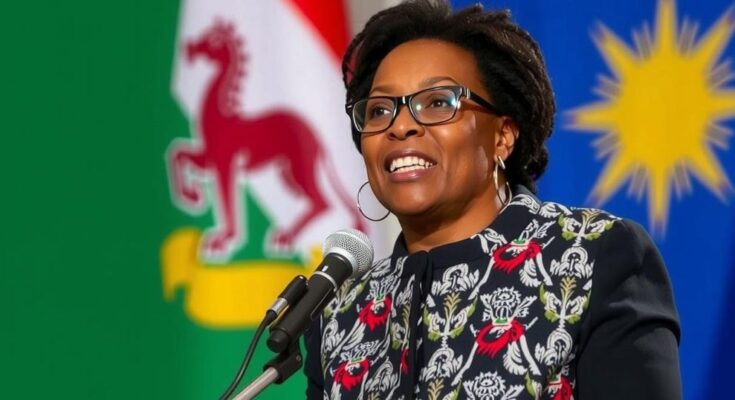Namibia’s presidential election is currently led by Vice President Netumbo Nandi-Ndaitwah of SWAPO, despite complications including a ballot paper shortage that led to a voting extension. The opposition has called the results into question, with legal challenges expected as they claim the election integrity has been compromised. Nandi-Ndaitwah’s lead raises hopes for a historic female presidency in a climate of rising economic discontent and allegations of corruption against the ruling party.
In the recent presidential elections in Namibia, Vice President Netumbo Nandi-Ndaitwah of the ruling South West Africa People’s Organization (SWAPO) is leading amid significant electoral issues, including a shortage of ballot papers that prompted an extension of the voting period. Early results indicate that Nandi-Ndaitwah has garnered approximately 56% of the votes counted thus far, with her main competitor, Panduleni Itula of the Independent Patriots for Change, trailing at 27%. The opposition has voiced serious concerns regarding the legality of the extended voting period, asserting that it compromises the electoral integrity. They are prepared to contest the results legally in the coming days.
Voters across Namibia experienced unprecedented challenges during the election, which was marked by logistical delays and allegations of negligence by election authorities. These complications raised questions about electoral fairness in a nation previously recognized for its stable democratic practices since independence in 1990. Although Nandi-Ndaitwah could make history as Namibia’s first female leader, SWAPO’s reputation has been tainted by allegations of corruption and rising economic frustrations among the populace, particularly the youth, who are struggling with high unemployment rates.
As discontent with ruling parties grows in southern Africa, the opposition parties in Namibia are aiming to strengthen their position amid a broader regional context of political transition and disruption.
The context of this election in Namibia highlights a rare instance of electoral challenges in a country otherwise known for its orderly electoral processes. Since its independence, Namibia has consistently been viewed as a model of democratic stability in southern Africa. However, the recent issues encountered during the 2024 presidential elections, such as a lack of resources and procedural mismanagement, have raised significant concerns among voters and opposition representatives. Additionally, the political landscape in southern Africa is undergoing changes, with various ruling parties facing demands for accountability and transparency from the electorate, further influencing the dynamics of Namibia’s current elections.
The ongoing presidential election in Namibia, therefore, serves as both a pivotal moment for potential leadership change and a litmus test for the country’s democratic resilience. With substantial opposition grievances regarding electoral irregularities and the potential for legal challenges, the future political landscape is uncertain. While Netumbo Nandi-Ndaitwah may be on the path to making history, the broader implications of the election’s legitimacy remain critical for the nation’s governance and the support of its citizenry.
Original Source: apnews.com




